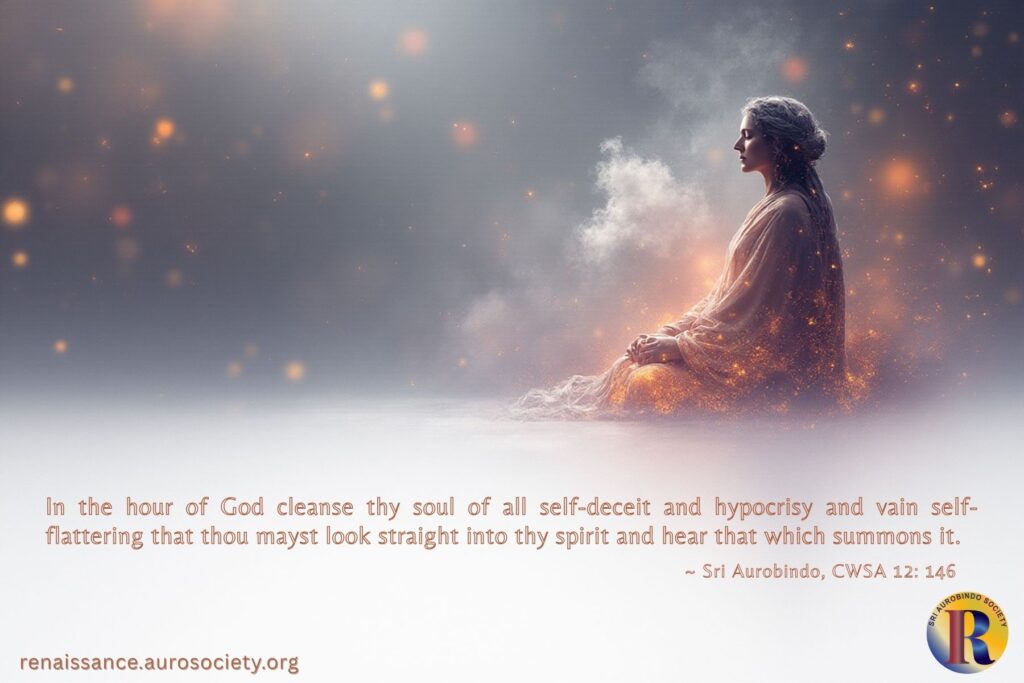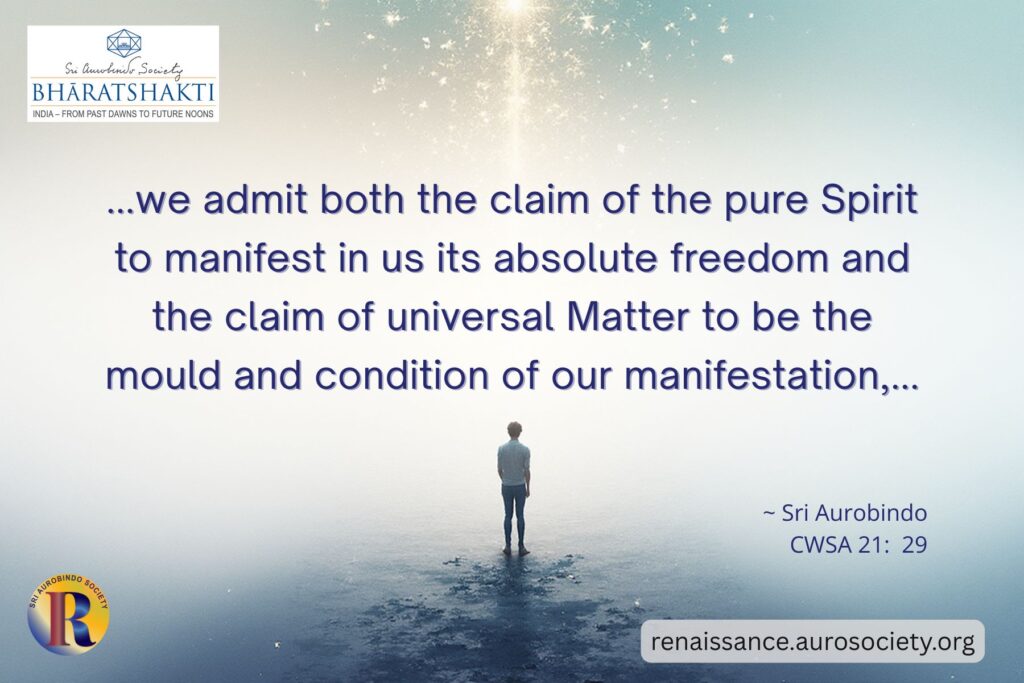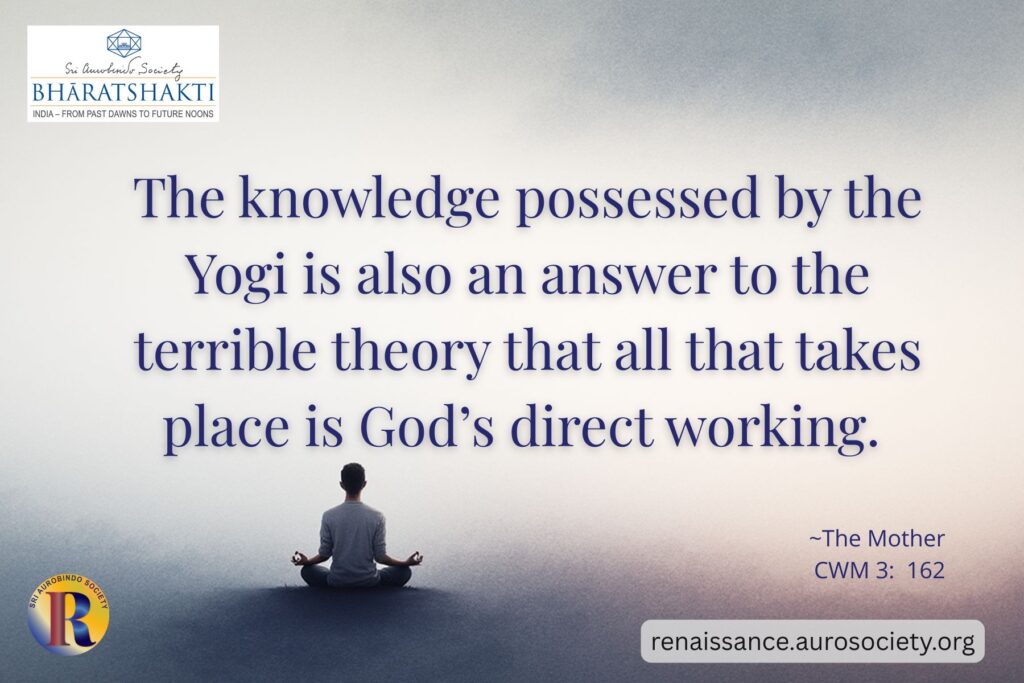Volume III, Issue 1
Author: A.L. Crampton Chalk
Continued from Part 1
It is, of course, taken for granted that the existence of a guiding spiritual or divinising force in our universe is acknowledged by all who are likely to read this essay. Indeed, it is more than likely that this principle is accepted in theory by half the human race or more, in one form or another. And in this fact, if it be so, lies the hope of our race and our free way of life in the immediate future.
But even those who acknowledge the existence, or possibility of existence, of some wider values to human life than are compassed by individual appetites and desires, do not necessarily try to find them. Or if they do, they seek them in a mistaken fashion and with no orientation towards the source of such higher values or principles.
The key to the search and the finding of human felicity and well-being is contained in Sri Aurobindo’s words at the head of this article. These epitomise the hopes and the promise of the achievement of what has so often appeared to be merely an ignis fatuus of all the ages of human thought – the possibility of harmony, peace, and goodwill on earth among men.
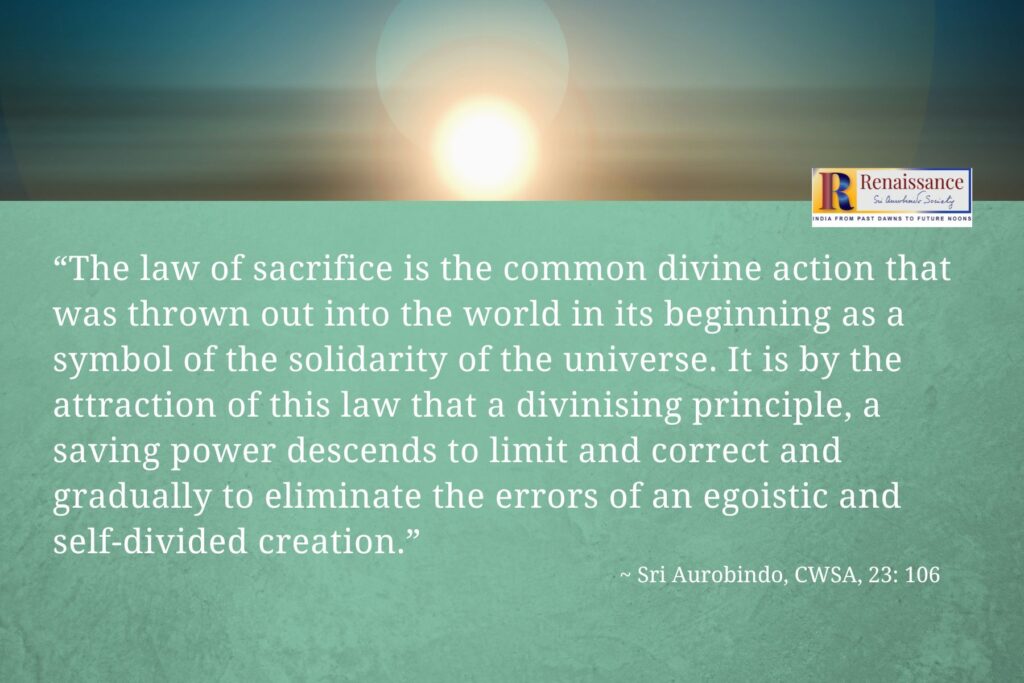
The deepest craving of the human heart is for the “solidarity of the universe” – that each one should feel that he belongs and is a cherished and indissoluble part of the life of the whole. There is, Sri Aurobindo says, one law which symbolises, demonstrates, and effects such a solidarity, and this is the law of sacrifice; this is the means for eliminating the errors of our egoistic and self-divided creation. By the application and invocation of sacrifice we may divinise our lives and bring down the power which will take hold of our affairs and bring them to harmony and ourselves to peace and fulfilment.
What is it that we are to sacrifice and how?
The answer is very clear.
“It is not one’s self, but the band of the spirit’s inner enemies that we have to discourage, expel, slay upon the altar of the growth of the spirit; these can be ruthlessly excised, whose names are desire, wrath, inequality, greed, attachment to outward pleasures and pains, the cohort of usurping demons that are the cause of the soul’s errors and sufferings. These should be regarded not as part of oneself but as intruders and perverters of our self’s real and diviner nature; these have to be sacrificed in the harsher sense of the word, whatever pain in going they may throw by reflection on the consciousness of the seeker.”
~ Sri Aurobindo, CWSA, 23: 107-108
The recognition that it is not one’s self that has to be discouraged is very important for it cuts right across the popular idea that sacrifice means self-immolation, self-effacement, and the surrender of some valuable and cherished possession to an outside and generally arbitrary power.
The true essence of sacrifice
Sacrifice is commonly thought of as leaving the participant worse off than he was – except for the anticipation of any calculated reward or quid pro quo. Or it may be associated with atonement or punishment for wrongs done. Nothing, of course, could be farther from the intention or effect of the sacrifice which is to be performed by the Spirit of Man if he is to achieve his true destiny.
“… the true essence of sacrifice is not self-immolation, it is self-giving; its object not self-effacement, but self-fulfilment; its method not self-mortification, but a greater life, not self-mutilation, but a transformation of our natural human parts into divine members, not self-torture, but a passage from a lesser satisfaction to a greater Ananda.”
~ Sri Aurobindo, CWSA, 23: 109
The sacrifice is a surrender or a destruction of those forces of his ego that limit his perceptions and powers, that make him think he is alone or chief in the universe. It is a process of self-giving to the Divine Power, to the Divine Shakti, and this self-giving involves him in the continuous and progressive purification from his selfish attributes.
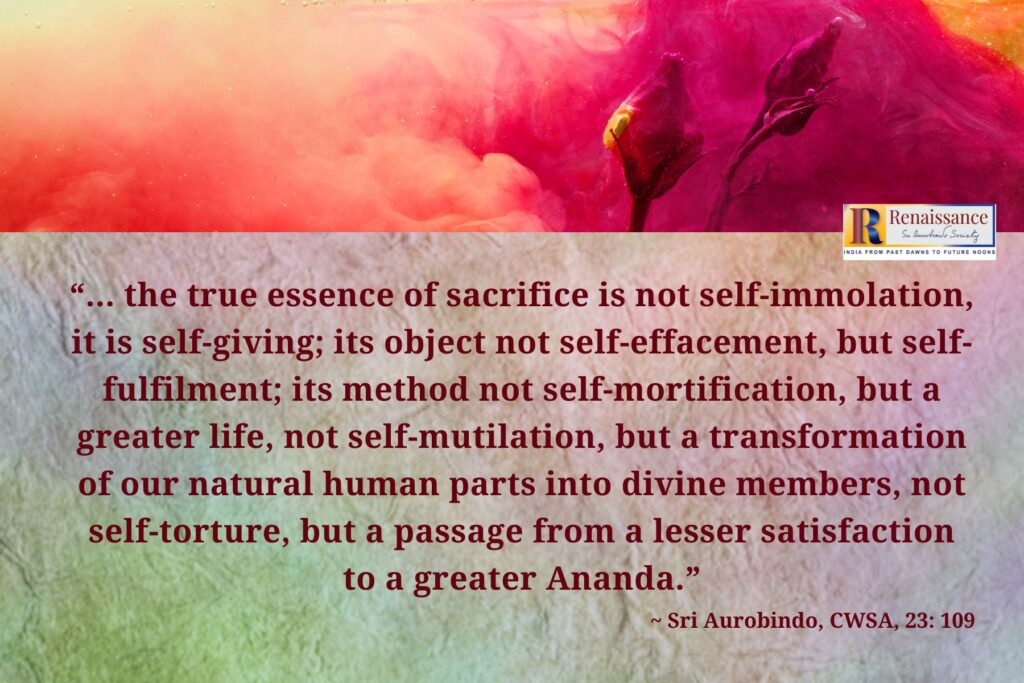
The discipline demanded
The discipline demanded in the early stages of spiritual apprenticeship may be painful, for the surface nature has had things its own way for a long time. Even when the neophyte begins to get a little light his troubles do not lessen – indeed, as the light gets stronger it shows up more clearly the previously hidden confusion and squalor of his lower nature; he seems to himself to get worse and not better. Perhaps he hesitates to make any gesture of self-giving where such a poor and unworthy self is available to give.
But sacrifice is the key to action in this mood – the continuous sacrifice of those things in himself that hold him back. To expel the enemies within his gates, to destroy, to cut off the parasites that have found refuge in his spiritual system and which feed on his egoism, this is his hope and his work.
No abandonment of action
It is evident that the divinisation of life, which is the solution to the riddle of human destiny, is not at all dependent upon the abandonment of action. It is necessary to state this with great emphasis because many schools of thought, and ways of religion, have sought to find God by abandoning man and his works and life. It is the particular quality of Sri Aurobindo’s presentation of truth that this principle is not only emphasised, but it is made the corner-stone of his teaching and purpose.
Life is to be made divine, not abandoned; there is no place in his scheme in teaching for the ascetic refusal, except as a purely temporary and disciplinary exercise. In any event, the effective elimination of action is not possible in human life, for co-operation with nature is essential so long as we are part of the very fabric of nature.
As the Gita says, we are under the spell of acting, whether we like it or not, so must try to make our action helpful and not harmful to ourselves and others. “If, indulging your self-will you should say – ‘I will not fight!’— your resolve will be vain for your own nature will compel you to it. In the toils of your own nature, arising from your past deeds, what you mistakenly desire to avoid, you will do in spite of yourself. The Lord is seated in the hearts of all beings, Arjuna, and by His magic power turns them about as if mounted on a machine.” (Chapter 18, verses 59-61)
To become self-conscious cooperators with our destiny
What we can do in the circumstances of our human consciousness is to choose how we will act and to become self-conscious co-operators with our destiny, whatever it is. We will try and make our actions conform to the divine pattern of events as it is laid at our human feet for action at the moment, and within all the swirling conflict and baffling contradictions of choices.
This, however, is not easy to do; in our daily movements and actions it seems desperately important to choose what is right, but at the same time bewilderingly difficult. While the ego is in unrestrained control of the personal situation there is no great bother about choosing a line of action; the more ‘others’ and their circumstances can be ignored, the easier choices of action are made.
But when the cruder desires are no longer allowed the run of their teeth in the personal life, choices of action seem to become obscure and difficult, and one of the first perplexities of the aspirant is to see where his spiritual duty lies. The attempt to eliminate or partially eliminate the ego as the king of the castle seems in many ways to complicate and not simplify the personal situation and its choices of action.
Putting one’s problems at the feet of the Divine
The answer is to be found by the aspirant in a technique of putting his problems at the feet of the Divine and of conditioning himself more and more as a willing channel for the action which will arise. He will endeavour to put himself into the state, exemplified by the Gita’s teaching, of non-attachment to action; doing the things which he can recognise as his immediate and proper duties but without attachment either to the action or the result.
The technique will be seen to be one of setting the egoism aside, of sacrificing or cutting away the hold of personal attributes, while using the mechanism of the ego for the concentration of divine power upon particular aspects of life. The ego must become an unimpeded channel for divine life to contact the material universe through the sacrifice of the inhibiting demons of desire, of one form and another, that are in temporary possession of it.
To be continued. . .
READ PART 1

~ Design: Beloo Mehra, Kavita Dutta and Biswajita Mohapatra

